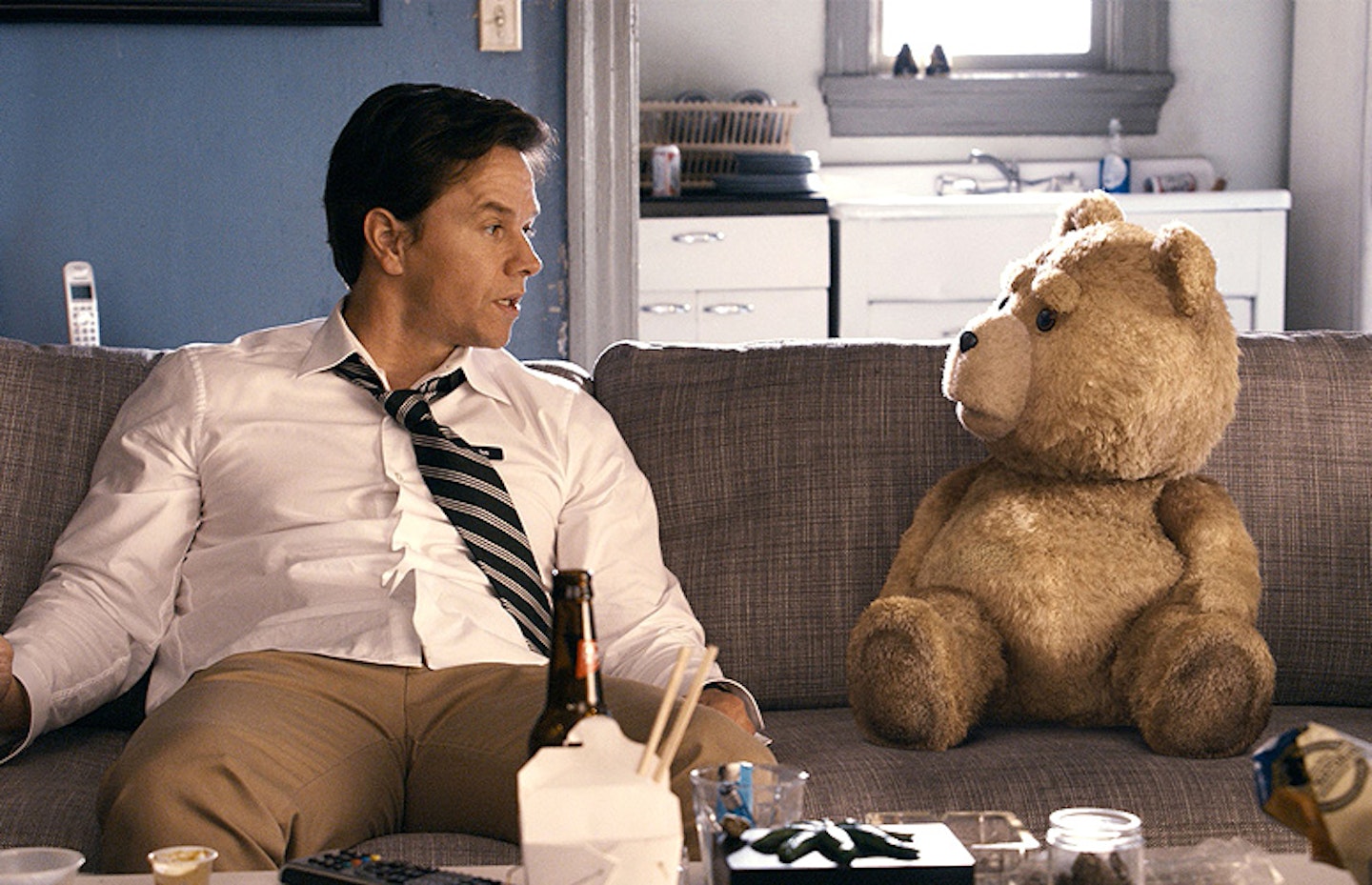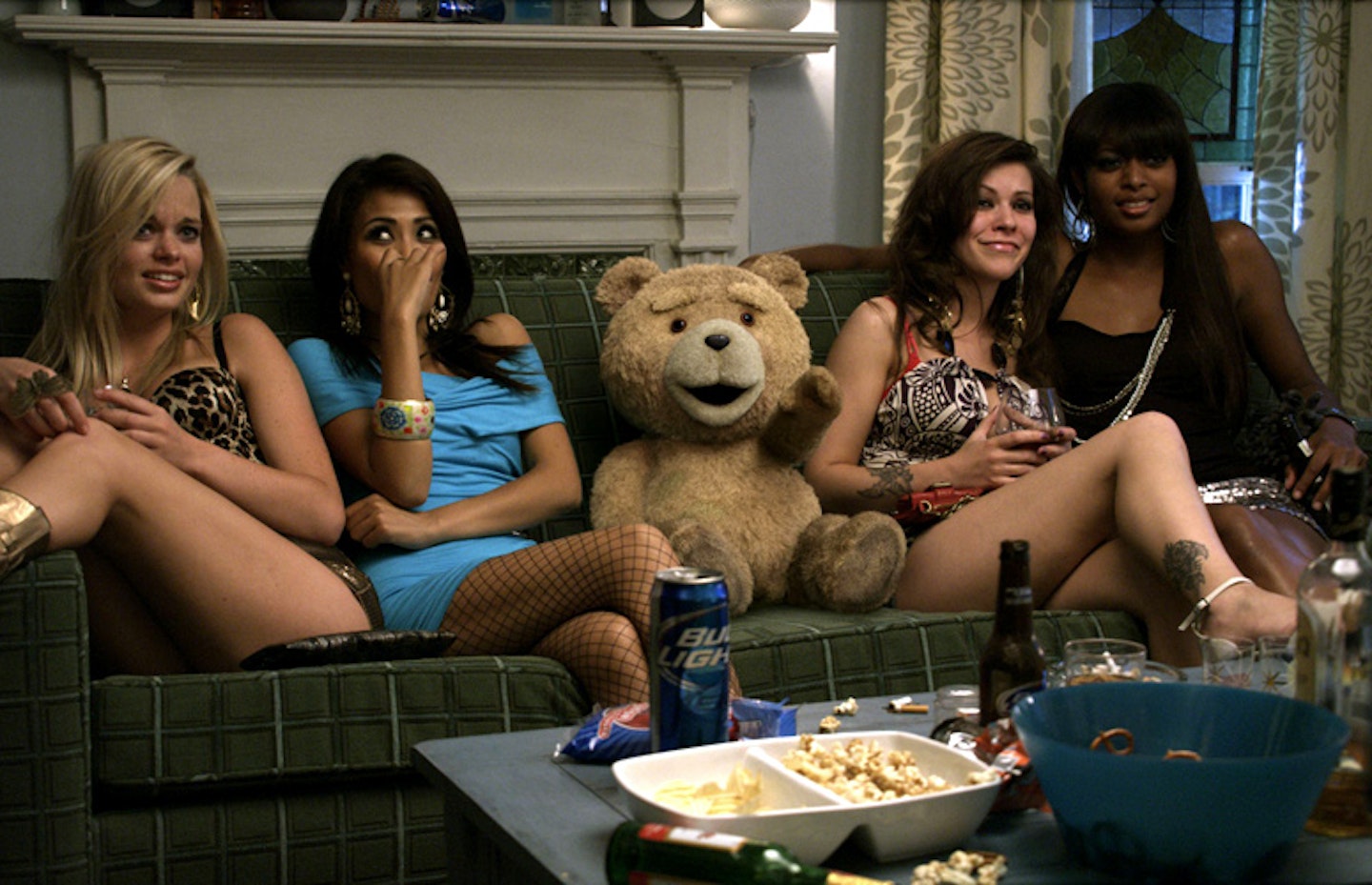Ahead of the release of Ted this summer, the first film from Family Guy and American Dad creator Seth MacFarlane, here's an exclusive look at Empire's full Ted feature. For much more on this summer's upcoming films, check out our magazine here (or here for US readers)

Well, basically it’s the story of a little boy who makes a wish that his teddy bear would come to life and talk to him and the wish somehow, in a very magical, Disneyesque way, comes true,” says Seth MacFarlane when asked to sketch out the basics of his feature debut, Ted. “But the boy is now an adult and the bear is still with him and it’s now no longer a childhood fantasy come true. It’s a burden on his relationship with his girlfriend. It’s a manifestation, in the worst way, of his inability to mature as a human being. So it’s really a love triangle between three individuals, one of whom happens to be a teddy bear.”
All of which is true as far as it goes. But there’s a wrinkle. One perhaps to be expected from the 38 year-old creator of Family Guy, the multiple Emmy-winning animated sitcom that regularly has the network censors at Fox reaching wearily for the scissors. This bear has a mouth fouler than a trawler’s hold in a heatwave. Oh, and apparently burgeoning drug issues.
“Oh yeah,” grins MacFarlane. “Yes, he’s foul-mouthed, he smokes pot. He’s a terrible, terrible influence.”
The notion for an animated series about a potty-mouthed Pooh had been knocking around for more than a while, but when MacFarlane couldn’t fully figure out how to make it work on TV, he put it on the back-burner and concentrated on Stewie, Lois, Peter and the gang. “It had been in my head for a number of years,” he says. “It initially was an animated show idea. It was the same premise, but in that version the guy grew up and had a family and the bear was with him and his family. It was the same predicament but the character structure was a little different.”
The problem was that with animation, MacFarlane couldn’t see how the idea of a walking, talking, !¢#@ing teddy could have the necessary reality. “If you were to animate everything then the idea of the bear being ‘real’ becomes a little muddled,” he says.
%20%20*Ted%20is%20a%20manifestation%20of%20his%20inability%20to%20mature.*%20*Seth%20Macfarlane*%20%20
Thus Ted, for all its bong hits and blow-job gags, might just be one of the most technically ambitious comedies since Bob Hoskins had his lapels grabbed by Roger Rabbit, not least because having cast himself as Ted, MacFarlane would not only be directing but also performing, regularly diving in front of the camera in full motion-capture regalia to interact with stars Mark Wahlberg and Mila Kunis.
“The mo-cap system that we used was ingeniously devised,” he says. “They came up with a way for me to do it all live. It was important that I could do that. I’d tried the bodystocking with the reflective beads all over it, but I said, ‘Guys, if I have to wear this for three months I’ll go crazy.’ They found a system that wasn’t so physically cumbersome that I couldn’t wear it while I was directing. So on the days that I was playing Ted I wore the suit, and it was a little uncomfortable but nothing that wasn’t manageable.”
Working live on set meant that Ted could interact totally naturalistically with the rest of the cast and the environment. “The biggest advantage is the audio. You’re not recording this character’s dialogue in the pristine environment of a recording studio, it’s live,” he says. “The microphone is the same microphone that is picking up everyone else’s dialogue, your voice is echoing off the same walls and it brings that character into the same world as Mark and Mila’s — it doesn’t sound like it was done weeks later in a recording booth. My goal at all times with this was to find a way to give the bear every freedom that a live actor would have. We could go off-script when we wanted to. We could talk over each other and so on. It makes it all feel like something you’ve never seen coming out of an animated character. It suddenly brings Ted into the world with real force.”
On the other side of the equation is Mark Wahlberg, an actor who proved, perhaps surprisingly to some, that he was as prodigiously talented at comedy as he seems to be at everything else, with the slightly underrated Adam McKay outing, The Other Guys, in 2010.
“There’s not much that he can’t do,” says MacFarlane. “He’s extraordinarily versatile. It’s always surprising because he’s such a humble guy, who’s not showy about it. He’ll just very quietly come onto set and do anything you throw at him. And do it brilliantly. The character of John has to pull the audience into this reality in a way that makes it seem like not that big a deal. He had to be able to talk to an empty space with the comfort that would show that that he was talking to another live actor, and Mark just knocked that out of the park.”
It helped that he’s a native of the story’s setting, Boston. “I wanted it to feel like a couple of Boston guys hanging out, so from a regional standpoint we knew he would be able to bring the Boston accent to it. In fact, he was so good, I was very self-conscious of whipping my accent back into shape because I’d been away for so long. But more importantly it was having somebody who can do all sorts of comedy. There’s broad physical comedy in the movie, there’s subtle dialogue comedy. It asks a lot of an actor. And Mark had displayed so many different skills in so many different movies that he seemed like he would be the perfect balance. He could give us everything we needed, every style.”
And, as anyone who’s seen The Departed will be in no doubt of, he can swear like a motherfucker, too.

For Macfarlane graduation from small screen to big naturally progresses a career that’s taken him from scribbling comic strips for his local paper as a boy, through stints working for animation giants Hanna-Barbera and Disney, to being the creator and showrunner of, alright, the second-most beloved animated series about a dysfunctional family on network TV.
“I’d always suspected that animation was a great preparation for making a feature film,” he says. “And that’s turned out to be correct. Because animation is so freeing and you can really experiment with things, ironically you can be more cinematic with animation than you can with live-action television. The storyboarding process has turned out to be very much the same. I slipped into it very, very quickly.”
In a sense, MacFarlane seems to have been a beneficiary of a new golden age of animation. After leaving college he emerged into an industry where animation was newly hip, with hit shows such as King Of The Hill, South Park and Beavis And Butt-Head demonstrating that this was a generation that, like Mark Wahlberg’s character in Ted, didn’t want to leave its childhood behind.
“The generation that was growing into adulthood had grown up with no bias against cartoons,” he muses. “They were inclined to give a prime-time animated show a chance. And the other thing was, The Simpsons had figured out how to do it so it didn’t suck. There had been a lot of attempts at prime-time animated shows prior to that. There was a show called Capitol Critters about animals living in the White House. And something called Fish Police, which is self-explanatory. And they just had no edge. They weren’t offering something you couldn’t get from a live-action show. And then here comes The Simpsons figuring out a way to actually make adults laugh. And they took a lot of guff for it at the get-go. There was all this negative press which now seems absurd. Bart is a bad influence. I mean, he talks back to his parents! What is this going to do to society? And they were right. Society immediately completely imploded and we’re now living in a wasteland.”
Now in the final days of Ted’s sound mix, he’s confident the film has turned out the way he wanted. “It’s the most pleasurable thing to look back on,” he smiles. “For the first time in my career, every frame is exactly the way I envisioned it in my head. That’s a hard thing to do on television, just in terms of time. The most exciting thing is to look at the screen and say, ‘Yeah, that was exactly there.’ Not 60 or 40 per cent, which is what usually happens with TV because you have to rush a lot. It’s all there.
“Look,” he says. “The truth is, if this movie is defective then I’m defective.”
For film news, reviews and exclusive interviews, have a look at the Empire U.S. iPad app over here.
brightcove.createExperiences();